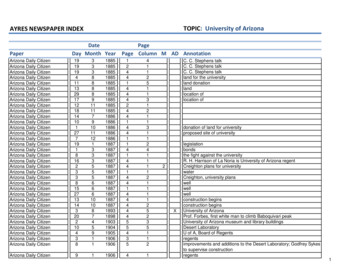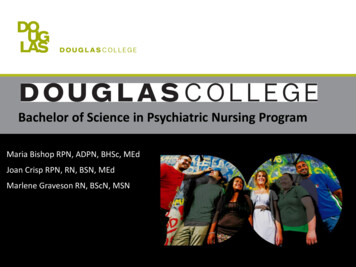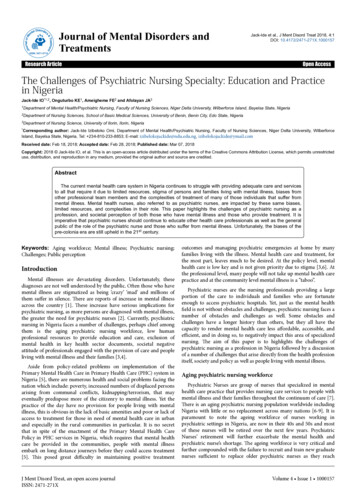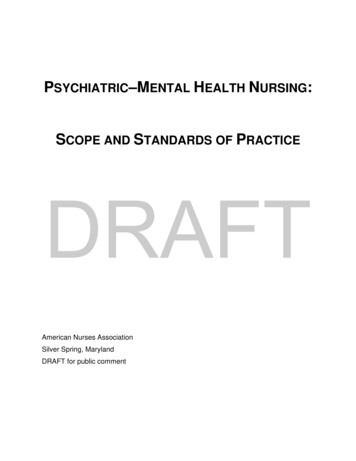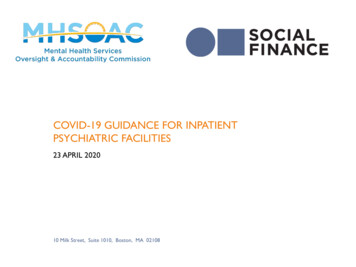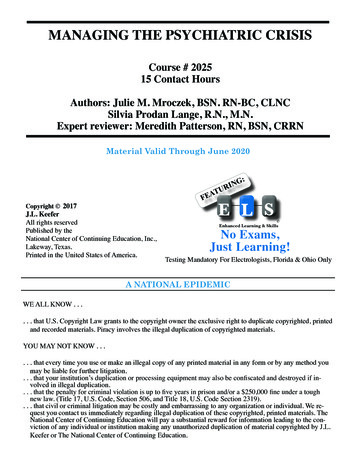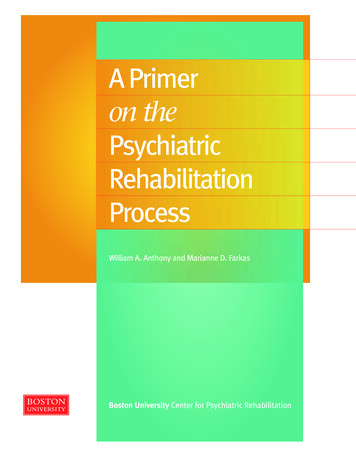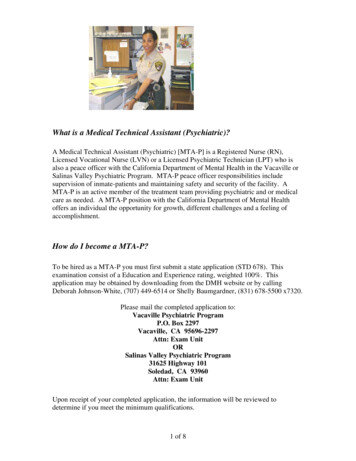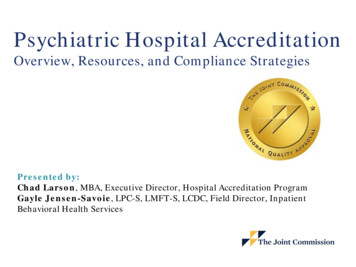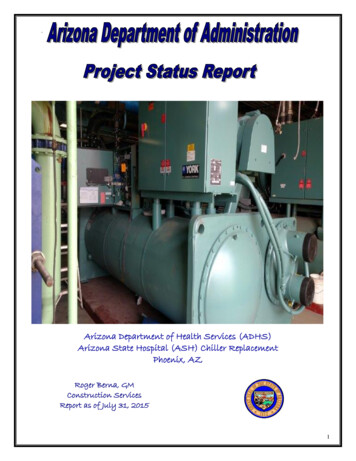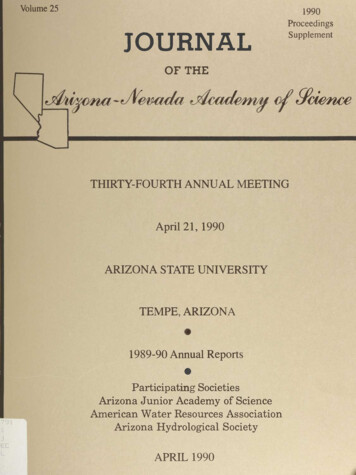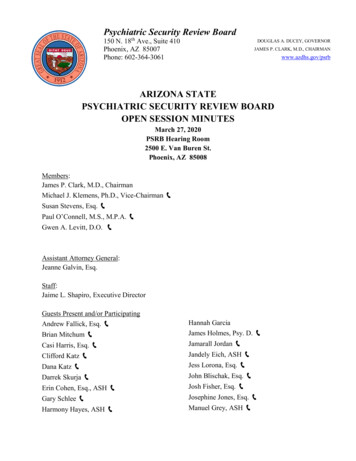
Transcription
Psychiatric Security Review Board150 N. 18th Ave., Suite 410Phoenix, AZ 85007Phone: 602-364-3061DOUGLAS A. DUCEY, GOVERNORJAMES P. CLARK, M.D., CHAIRMANwww.azdhs.gov/psrbARIZONA STATEPSYCHIATRIC SECURITY REVIEW BOARDOPEN SESSION MINUTESMarch 27, 2020PSRB Hearing Room2500 E. Van Buren St.Phoenix, AZ 85008Members:James P. Clark, M.D., ChairmanMichael J. Klemens, Ph.D., Vice-Chairman Susan Stevens, Esq. Paul O’Connell, M.S., M.P.A. Gwen A. Levitt, D.O. Assistant Attorney General:Jeanne Galvin, Esq.Staff:Jaime L. Shapiro, Executive DirectorGuests Present and/or ParticipatingAndrew Fallick, Esq. Brian Mitchum Hannah GarciaJames Holmes, Psy. D. Clifford Katz Jandely Eich, ASH Casi Harris, Esq. Dana Katz Darrek Skurja Erin Cohen, Esq., ASH Gary Schlee Harmony Hayes, ASH Jamarall Jordan Jess Lorona, Esq. John Blischak, Esq. Josh Fisher, Esq. Josephine Jones, Esq. Manuel Grey, ASH
Arizona State Psychiatric Security Review BoardOpen Session MinutesMarch 27, 2020Page 2 of 9Nicol Green, Esq. Rebecca Lane, Spectrum Robin Ward, Spectrum Tammy Wray, Esq. Participated TelephonicallyCall To Order:James Clark called the meeting to order at 1:04 p.m. and read the Executive SessionConfidentiality Statement:“Minutes of and discussions made in executive session are required by law to be keptconfidential and shall not be communicated to any person outside this meeting room, exceptto members of the Board, a person who is the subject of the discussion pursuant to ArizonaRevised Statutes (A.R.S.) § 38-431.03(A)(1), the Auditor General in connection with an auditauthorized by law, and the Attorney General. This means that persons present during anexecutive session of the PSRB may not disclose any information regarding the executivesession or discuss those proceedings with any person who was not also present at the executivesession.”Dr. Clark swore in individuals who anticipated testifying.Statutory Hearings:Clifford Andrew Katz – PSRB No. 15-07Clifford Katz was present telephonically with his wife Dana Katz, and through counsel,Andrew Fallick, who appeared telephonically. The statutory hearing was held from 1:07 p.m.to 1:12 p.m. pursuant to A.R.S. § 31-502(A)(5) and (B)(4). The outpatient team wasrecommending removal of the community meetings requirement.Rebecca Lane from Spectrum Healthcare was present telephonically and stated that Mr. Katzhas been compliant with all treatment plans, recommendations, and instructions. He continuesto remain in stable remission.Gwen Levitt asked if the Board were to grant this modified treatment plan, would Mr. Katzstill be required to submit a Urine Drug Screen.Rebecca Lane stated that yes, Mr. Katz would still participate in random Urine Drug Screens.Michael Klemens wanted to clarify if this request to remove the community meetingattendance requirement is a temporary, or permanent request.Rebecca Lane stated that this is a permanent request.
Arizona State Psychiatric Security Review BoardOpen Session MinutesMarch 27, 2020Page 3 of 9After discussion, a motion was made by James Clark, seconded by Susan Stevens, and passedunanimously to modify the conditional release to the community treatment plant to discontinuethe requirement for community meetings attendance due to numerous major health issues. Mr.Katz remains in a stable remission, and is not dangerous.Gary Willard Schlee – PSRB No. 12-10Gary Schlee was present telephonically and through counsel, Andrew Fallick who appearedtelephonically. The statutory hearing was held from 1:13 p.m. to 1:25 p.m. pursuant to A.R.S.§ 31-502(A)(5) and (B)(4). The outpatient team is recommending a step-down in residentialmonitoring and a reduction in case management.Rebecca Lane from Spectrum Healthcare was present telephonically. She stated that Mr.Schlee has been compliant and stable during treatment. The outpatient team is requesting astep-down in Mr. Schlee’s residential monitoring from a 24-hour facility, to a 16-hour facilityto provide more flexibility.James Clark asked for clarification regarding Mr. Schlee’s current case managementprocedure.Rebecca Lane stated that during the course of a month, she has a phone session with Mr. Schleethe first week, has a face-face session the second week, a phone session the third week, and aface-to-face session the fourth week. Rebecca Lane also stated that if there is a fifth week tothat particular month, she would conduct a phone session with Mr. Schlee. Mr. Schlee is alsoparticipating in telehealth appointments for psychiatric healthcare with Dena Wampler fromSpectrum Healthcare.James Clark inquired about the potential for added stress to Mr. Schlee with the potential ofbuying a new automobile and asked if he has sufficient funds to maintain this purchase.Gary Schlee stated that he has been able to save enough money to not only purchase anautomobile, but also handle other auto related expenses as well.Gwenn Levitt addressed her concern with Mr. Schlee being granted both a step-down from a24 hour facility to a 16 hour facility, and reducing his number of contacts at the same time. Sheproposes that the outpatient treatment team transition Mr. Schlee from a 24 hour facility to a16 hour facility, but keep his case management schedule the same for several more months inorder to ensure that Mr. Schlee remains stable during his transition.
Arizona State Psychiatric Security Review BoardOpen Session MinutesMarch 27, 2020Page 4 of 9After discussion, a motion was made by James Clark, seconded by Susan Stevens, and passedunanimously to grant Mr. Schlee to step down from a 24-hour facility, to a 16-hour facility,and have Mr. Schlee’s case management schedule to remain the same for the first three months.Mr. Schlee remains in stable remission and is not dangerous.Darrek John Skurja– PSRB No. 15-06Darrek Skurja was present telephonically, and through counsel, Andrew Fallick, who appearedtelephonically. The statutory hearing was held from 1:26 p.m. to 1:31 p.m. pursuant to A.R.S.§ 13-3994(H). ASH is recommending phase two, level three conditional release.After further discussion, a motion was made by Paul O’Connell, seconded by Gwenn Levitt,and passed unanimously to grant Mr, Skurja conditional release to the Arizona State Hospital,phase two, level three. Mr. Skurja remains in stable remission and is not dangerous.Scott Joe Peterson– PSRB No. 16-03Scott Peterson declined to attend. His counsel, Andrew Fallick, appeared telephonically. Thestatutory hearing was held from 1:32 p.m. to 1:36 p.m. pursuant to A.R.S. § 13-3994(H). Thiswas a two-year hearing and there was no recommendation. Mr. Fallick waived Mr. Peterson’spresence.After further discussion, a motion was made by Susan Stevens, seconded by Michael Klemens,and passed unanimously to deny conditional release for Scott Peterson based on the evidencepresented by the Arizona State Hospital’s treatment team, that Mr. Peterson did not prove byclear and convincing evidence that he no longer suffers from a mental disease or defect, thatthe mental disease or defect is in stable remission, and that he is no longer dangerous. Mr.Peterson shall remain committed in the Arizona State Hospital.Brian Price Mitchum– PSRB No. 17-16Brian Mitchum was present telephonically and through counsel, Jess Lorona, who appearedtelephonically. The statutory hearing was held from 1:37 p.m. to 1:47 p.m. pursuant to A.R.S.§ 13-3994(H). This was a two-year hearing and there was no recommendation.Jess Lorona stated that one year prior to Mr. Mitchum’s admission to the Arizona StateHospital, he was doing well under outpatient care. He voluntarily checked himself back intomultiple facilities for stabilization. Before Mr. Mitchum was held at the Apache CountySheriff’s Office awaiting transport to the Arizona State Hospital, he took part in psychotherapyand outpatient treatment. Jess Lorona also stated that during the time Mr. Mitchum was in thecommunity, without much supervision, he remained non-dangerous.
Arizona State Psychiatric Security Review BoardOpen Session MinutesMarch 27, 2020Page 5 of 9James Clark asked for clarification regarding the time Mr. Mitchum spent in a treatmentprogram prior to him being admitted to a hospital in Utah.Jess Lorona stated that Mr. Mitchum was admitted to the Discover Center in Utah and did notdo well at this center, but was then involuntarily admitted to the University NeuropsychiatricInstitute (“UNI”). Once he was released, he voluntarily re-admitted himself for stabilization.Brian Mitchum stated that on multiple occasions, he had the opportunity to voluntarilyparticipate in multiple treatment programs, and he took advantage of every opportunity. Healso expressed his feeling that the treatment program that he is currently participating in at theArizona State Hospital is not as beneficial as he would like it to be.After further discussion, a motion was made by Gwenn Levitt, seconded by Paul O’Connell,and passed unanimously to deny conditional release for Brian Mitchum based on the evidencepresented by the Arizona State Hospital’s treatment team, that Mr. Mitchum did not prove byclear and convincing evidence that he no longer suffers from a mental disease or defect, thatthe mental disease or defect is in stable remission, and that he is no longer dangerous. Mr.Mitchum shall remain committed in the Arizona State HospitalRodney Bruce Woodville– PSRB No. 13-15Rodney Woodville declined to attend and his presence was waived by his counsel, JohnBlischak, who appeared telephonically. The statutory hearing was held from 1:48 p.m. to 1:50p.m. pursuant to A.R.S. § 13-3994(H). This was a two-year hearing and there was norecommendation.After further discussion, a motion was made by James Clark, seconded by Susan Stevens, andpassed unanimously to deny conditional release for Rodney Woodville based on the evidencepresented by the Arizona State Hospital’s treatment team, that Mr. Woodville did not prove byclear and convincing evidence that he no longer suffers from a mental disease or defect, thatthe mental disease or defect is in stable remission, and that he is no longer dangerous. Mr.Woodville shall remain committed in the Arizona State Hospital.Jamarall Jordan– PSRB No. 04-01Jamarall Jordan was present telephonically and through counsel, John Blischak who appearedtelephonically. The statutory hearing was held from 1:51 p.m. to 2:10 p.m. pursuant to A.R.S.31-502(A)(5) and (B)(4). The outpatient treatment team recommended an increase in workhours and out-of-State travel.
Arizona State Psychiatric Security Review BoardOpen Session MinutesMarch 27, 2020Page 6 of 9James Clark stated that the outpatient team is also requesting the removal of twelve-stepmeeting attendance on a regular basis. James Clark noted that after reviewing all theconditional release reports it appeared as though Mr. Jordan was attending regularly and not“at his leisure” and that 12 STEP meeting attendance seemed to be an integral part of histreatment plan.Jamarall Jordan stated that this statement was correct.Michael Klemens expressed a concern about Mr. Jordan driving to El Paso, Texas in one dayto pick up his mother, and then returning with her, the same day. He stated that this would beclose to one thousand miles travelled.Mr. Jordan stated that he would be able to drive to El Paso, but his mom would be able to helpout with the drive to Arizona.Michael Klemens asked the outpatient treatment team if it is possible for Mr. Jordan to receiveany medication that he is scheduled to take, before he was to leave to El Paso, Texas.Manuel Gray from La-Frontera-EMPACT, stated that the patient team would be able to makethis request happen for Mr. Jordan.Jamarrall Jordan stated that he has been approved for out-of-state travel before, and that he isnot new to driving long distances.James Clark stated that regarding the request to remove twelve-step meetings for Mr. Jordan,it has seemed as though they have been a big part of his life, over a long period of time, andthat meeting attendance can help show how to lead a balanced life with using drugs.Jamarall Jordan stated that when he was arrested, he had no drugs in his system. He stated thatthese meetings are not specific to him, and that he is only attending these meetings to stay inthe community. He feels as though he has had little benefit from the twelve-step meetings.John Blischak stated that Mr. Jordan always answers his phone calls, and there has never beenany problem. He stated that the Board will have no problem with Mr. Jordan, and that he willcomply.After further discussion, a motion was made by James Clark to grant Mr. Jordan fifty-five workhours per week, that the community meeting requirement remain in place, and that Mr. Jordanbe allowed to travel on April 19, 2020 and April 20, 2020 to El Paso, Texas to pick-up his
Arizona State Psychiatric Security Review BoardOpen Session MinutesMarch 27, 2020Page 7 of 9mother, and return to Arizona. Mr. Jordan must also notify the Board when he plans onreturning his mother to El Paso, Texas from Arizona.Jamarall Jordan asked the Board to extend the flexibility of his travel days, due to the fact thathis wife could have their baby before or after the set dates that were given.James Clark amended his motion to grant travel anywhere from April 13, 2020 to April 19,2020, and notify the Board in writing when he plans to return his mother from Arizona to ElPaso, Texas. Seconded by Susan Stevens and passed unanimously.Gary Reagan Sherrill– PSRB No. 16-04Gary Sherrill was not presence. His counsel, Tammy appeared telephonically and waived Mr.Sherrill’s presence. The statutory hearing was held from 2:11 p.m. to 2:14 p.m. pursuant toA.R.S. § 13-3994(H). This was a two-year hearing, there is no recommendation.Tammy Wray stated that her and Mr. Sherrill meet on a regular basis, and Mr. Sherrill madethe decision to not appear today in light of the current circumstances. She also stated that Mr.Sherrill is working on his recovery, and is looking forward to come before the Board at a futuredate.After further discussion, a motion was made by Susan Stevens, seconded by Gwen Levitt, andpassed unanimously to deny conditional release for Gary Sherrill based on the evidencepresented by the Arizona State Hospital’s treatment team, that Mr. Sherrill did not prove byclear and convincing evidence that he no longer suffers from a mental disease or defect, thatthe mental disease or defect is in stable remission, and that he is no longer dangerous. Mr.Sherrill shall remain committed in the Arizona State Hospital.Discussion and Possible Action Related to:Legislative Update: SB1053, HB2320James Clark stated that it was his understanding that SB1053 was passed by the legislature,SB1053 continues the Psychiatric Security Review Board until 2028. It is not certain ifHB2320, which is the proposed GEI statute rewrite, will be presented to the Senate JudiciaryCommittee during the 2020 legislative session.Susan Stevens stated that the legislature is currently in recess until April 13, 2020. They willmost likely reconvene at a later date and continue with multiple bills.James Clark mentioned that there was a document submitted by the Arizona Center ofDisability Law that expressed concerns about HB2320 redefining the definition of “mental
Arizona State Psychiatric Security Review BoardOpen Session MinutesMarch 27, 2020Page 8 of 9disorder” to include psychiatric or neurological conditions including conditions resulting frominjury, disease or developmental disability. The current GEI statute uses “mental disease ordefect” terminology and is limited to mental illnesses and not neurological conditions,traumatic brain injuries or developmental disabilities.Susan Stevens stated that HB2320 still has the whole Senate process to go through.Amended Conditional Release Plans:Jaime Shapiro stated that a number of months ago, the Board had amended a patient conditionalrelease treatment plan, however, staff at the Arizona State Hospital refused to resubmit anamended conditional release treatment plan to the PSRB Order. Erin Cohen (ASH Attorney)responded with an email stating that going forward, ASH will not be submitting amendedrelease plans that have been amended by the PSRB at Board meetings. James Clark noted thatit is rare for ASH staff to decline to agree with a PSRB amendment to a conditional releasetreatment plan.Michael Klemens stated that he had a concern about the nature of this problem. He expressedthat he would hate to have to deny a conditional release plan for a patient due to a typo, or inan instance where the Arizona State Hospital is requesting levels three and four, but the Boardwould only accept level three.Susan Stevens stated that it would be important to meet with Arizona State Hospital in orderto explain what is exactly meant in the email that was written by Erin Cohen.Acceptable Alternatives for Compliance for Community Released Individuals during COVID19 Pandemic:Jaime Shapiro stated that within this document, there are multiple alternatives for patients tostay compliant while social distancing and limiting face-to-face contact.James Clark made a motion, seconded by Gwenn Levitt, and passed unanimously to approvethe Acceptable Alternatives for Compliance for Community Released Individuals duringCOVID-19 Pandemic, in the duration of this emergency.Staffing Updates:James Clark thanked Jaime Shapiro on behalf of the Board for her diligence, dedication andservice.Hannah Garcia introduced herself to the Board and participants on the line.
Arizona State Psychiatric Security Review BoardOpen Session MinutesMarch 27, 2020Page 9 of 9Discussion, Amendment, and Approval of Minutes:Open and executive session minutes from the January 31, 2020, meeting:James Clark made a motion, seconded by Gwenn Levitt, voted 3-0-2 to accept the open andexecutive session minutes from January 31, 2020 as amended.Open and executive session minutes from February 28, 2020, meeting:James Clark made a motion, seconded by Paul O’Connell, voted 4-0-1 to accept the open andexecutive session minutes from February 28, 2020 as amended.Identification of Future Agenda ItemsAdjournment:The Board meeting adjourned 2:44 p.m.
Gwen Levitt asked if the Board were to grant this modified treatment plan, would Mr. Katz still be required to submit a Urine Drug Screen. Rebecca Lane stated that yes, Mr. Katz would still participate in random Urine Drug Screens. Michael Klemens wanted to clarify if this request to remove the community meeting
